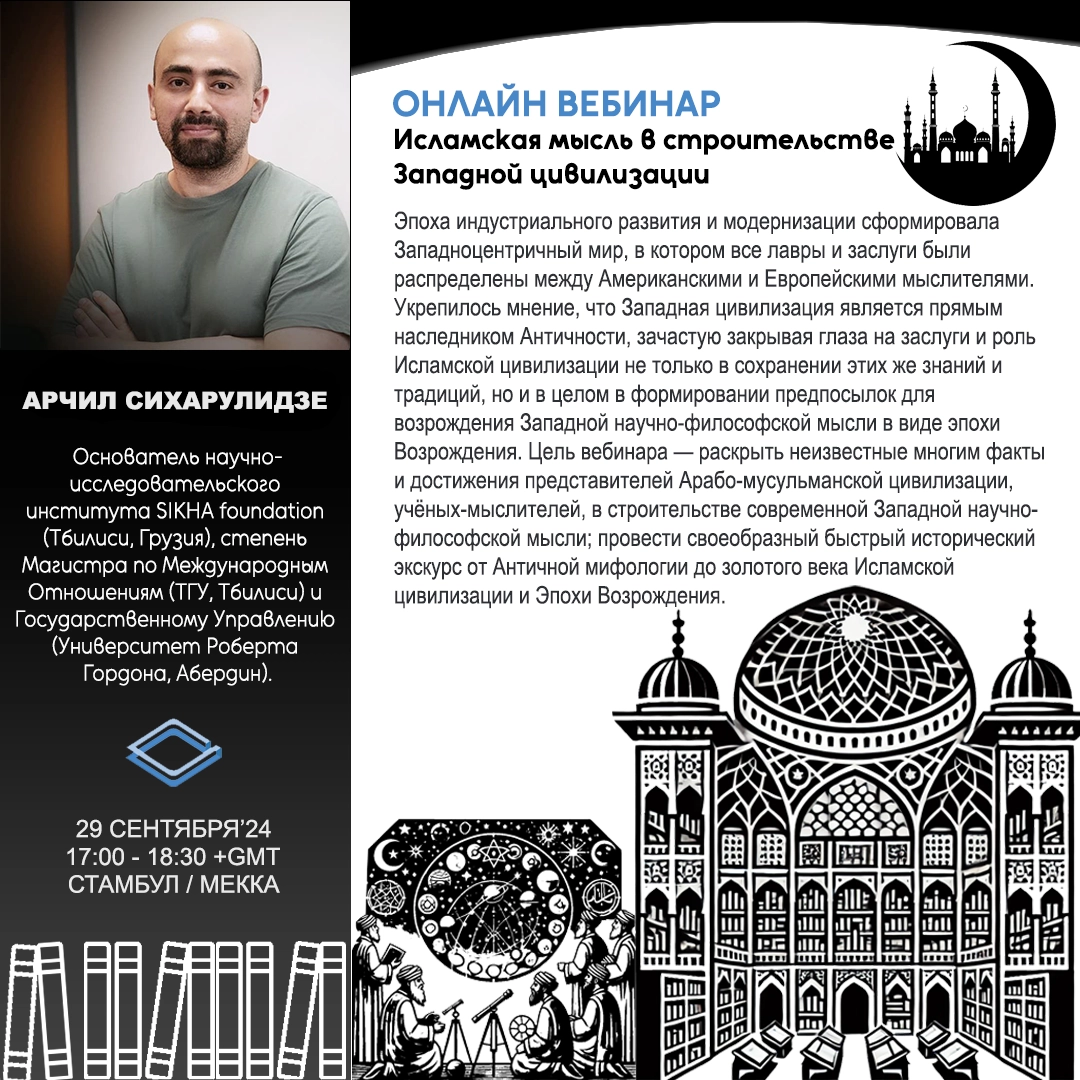As part of the IIIT Lectures Series for CIS Countries, a lecture titled “Islamic Thought in the Construction of Western Civilization” was held on September 29, delivered by Archil Sikharulidze—Founder of the research institute SIKHA Foundation (Tbilisi, Georgia), holder of a Master’s degree in International Relations (TSU, Tbilisi) and Public Administration (Robert Gordon University, Aberdeen).
The lecturer divided his lecture into three conceptual parts:
1. The Tale of Direct “Inheritance”
2. Real History
3. Forgotten History
The first part consisted of a presentation of the dominant image of the so-called Western history, depicted as a continuous phenomenon that began in antiquity, continued through the Roman period, shifted into the “stagnation” of the Middle Ages, and transformed through the Renaissance into modernity.
In this perspective, “stagnation” is seen not as a local but as a global phenomenon, which allows for viewing modernity through the prism of the uniqueness of Western civilization.
This uniqueness, in turn, gives the right to “instruct others.” The West is seen as the sole heir of antiquity.
This Western-centric view of the world remains dominant in public consciousness.
In the second part of the lecture, the focus was on attempting to understand real history, where the period of the local Western “stagnation” ran parallel to the “Golden Age” of Islamic civilization.
The lecturer emphasized that the legacy of antiquity does not belong exclusively to the West but to many different cultures that preserved and reworked the Greek heritage, with Islamic civilization playing a significant role.
The lecturer highlighted the necessity of moving away from the idea of the uniqueness of Western civilization towards understanding it as a complex hybrid historical phenomenon.
In this context, the following postulates about the West are reconsidered:
• “Unique continuity as a guarantee of dominance” is replaced with “Continuity that is not guaranteed”;
• “Privatization of antiquity and the Roman heritage” is replaced with “The West is unique, but not dominant”;
• “Privatization of Christianity” is replaced with “Christianity as part of a global heritage”;
• “Primacy and globality, ‘universality’ of Western civilization (S. Huntington)” is replaced with “Complexity as a feature of a complex historical process.”
In the third part of his lecture, the lecturer spoke about the “forgotten history.”
He mentioned the contribution of Islamic civilization to the translations of ancient authors into Arabic, through which Western civilization could once again turn to the legacy of antiquity.
He also discussed the concept of “ijtihad,” which the lecturer defined as the development, reworking, and advancement of the scientific achievements of ancient Greek and Roman scholars. This, in turn, put Islamic civilization into a global dialogue with other civilizations.
He spoke about the contributions of Muslim scholars to the exact sciences: Arabic numerals, algebra, and geometry.
The lecturer mentioned great Muslim inventions such as water clocks, astronomical maps, armillary spheres, universities founded by Muslims, and great Muslim inventors like Abbas Ibn Firnas.
At the end of his lecture, Archil quoted renowned archaeologist Naoíse Mac Sweeney:
“Western civilization is not a direct descendant of antiquity and Rome. Much knowledge was acquired through Islamic scholars and thinkers, who laid the foundations for the Renaissance, the revival of Western thought.”









